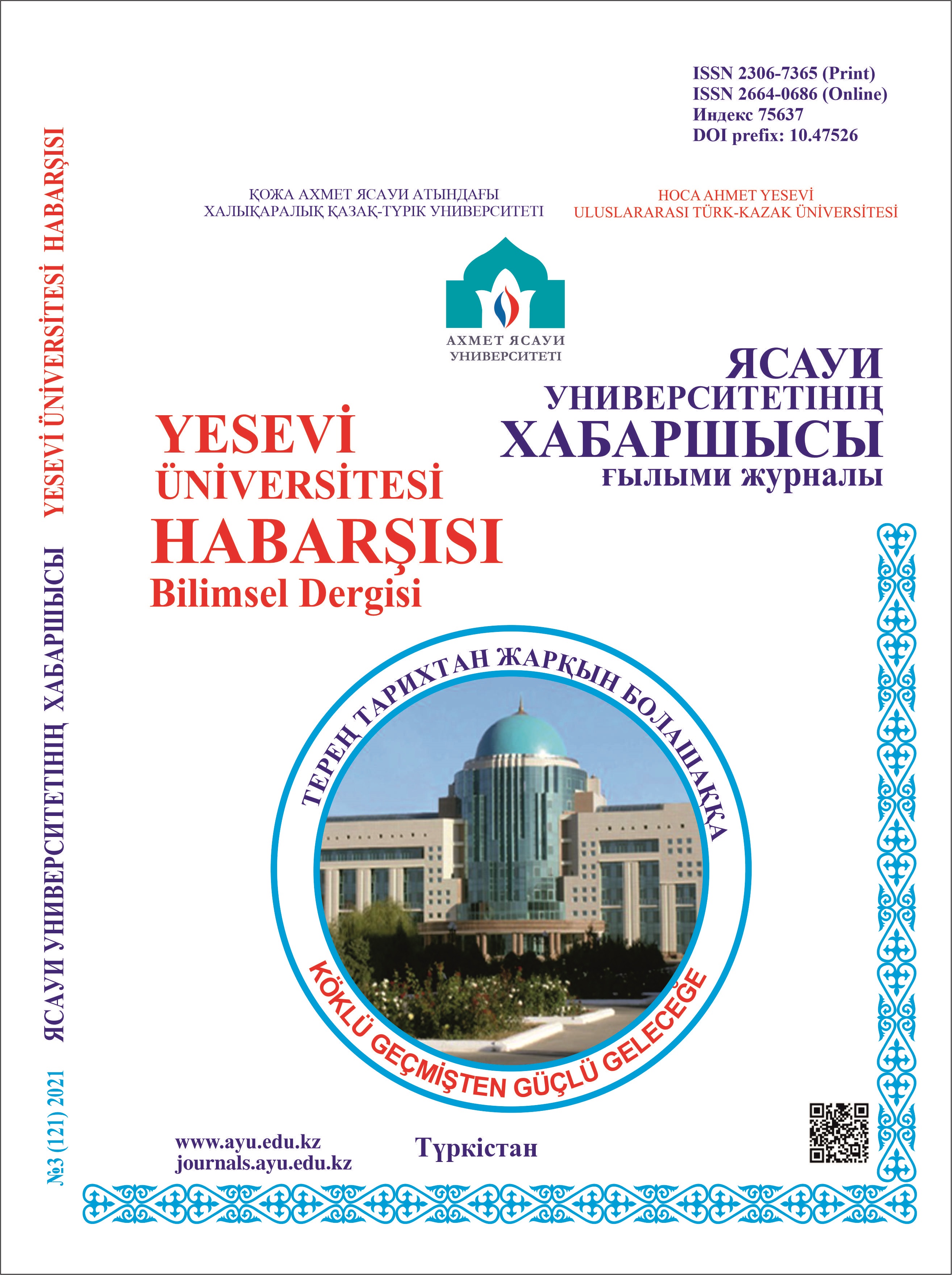Coursera Platformunda Yaygın Eğitim: Bölgesel Bir Üniversite Deneyimi
252 129
Anahtar Kelimeler:
yaygın eğitim, kurs, kişisel gelişim, mesleki gelişim, dil seviyesi, üniversite öğrencileri.Özet
Bu makale, Kazakistan’da yaygın eğitim için bir kaynak olarak Coursera platformunda devasa açık çevrim içi kursların kullanımının tartışılmasını hedeflemektedir. Bu araştırmanın yazarları yaygın eğitimi öğrencilerin kişisel ve mesleki gelişimlerine yönelik stratejilerden biri olarak tanımlamaktadır. Makalenin amacı, büyük ve açık çevrim içi kursların, okuyan dil ana dallarının dil düzeyini iyileştirmedeki etkinliğini değerlendirmektir. Teorik ve karşılaştırmalı analiz, pedagojik deney, test ve içerik analizi gibi çeşitli yöntemlerin kullanımı, çalışma sürecinde toplanan bulguları göstermek için açıklanmıştır. Bu araştırmada parametrik olmayan istatistiksel kriter Mann-Whitney U-testi ve SPSS İstatistik 27.0 programı gibi matematiksel istatistik yöntemlerinden yararlanılmıştır. Pedagojik deneyde, Alkey Margulan adını taşıyan Pavlodar Pedagoji Üniversitesi’nin ‘Yabancı Dil: İki Yabancı Dil’ eğitim programının 68 3. sınıf öğrencisi yer aldı. Coursera platformundaki 4 büyük açık çevrim içi kurstan veriler toplandı: ‘Daha Akıllı Çalışın, Daha Zor Değil: Kişisel ve Profesyonel Üretkenlik için Zaman Yönetimi’, ‘Herkes için Programlama (Python’a Başlarken)’, ‘Proje Yönetimi: Başarının Temelleri’ ve ‘Lider Ekipler: Etkili Ekip Kültürleri Oluşturmak’. Ampirik çalışma ve sonuçlar, Coursera platformundaki devasa açık çevrim içi kursların dil yeterlilik düzeyini % 23,6 artırarak öğrencilerin hedeflerini üniversite dışında gerçekleştirmelerine ve ayrıca üstbilişsel yeteneklerini geliştirmelerine olanak tanıdığını gösterdi.
Referanslar
Национальный план развития Республики Казахстан до 2025 года. [Электронный ресурс]. URL: https://adilet.zan.kz/rus/docs/U1800000636 (дата обращения 16.01.2024)
Концепция развития высшего образования и науки в Республике Казахстан на 2023-2029 годы. [Электронный ресурс]. URL: https://adilet.zan.kz/rus/docs/P2300000248 (дата обращения 25.01.2024)
Государственный общеобязательный стандарт высшего и послевузовского образования. [Электронный ресурс]. URL: https://adilet.zan.kz/rus/docs/V2200028916 (дата обращения 02.02.2024)
Иванищева Н.А. Неформальное образование студентов педагогических университетов // Непрерывное образование: XXI век. – 2022. – №4(40). – С. 1–10. https://doi.org/10.15393/j5.art.2022.8008
Якушина М.С. Неформальные образовательные практики в пространстве непрерывного образования педагогов // Человек и образование. – 2022. – №1(62). – С. 9–15.
Holland A.A. Effective principles of informal online learning design: A theory-building metasynthesis of qualitative research // Computer & Education. – 2019. – №128. – P. 214–226. https://doi.org/10.1016/j.compedu.2018.09.026
Jansen R.S., Leeuwen A., Janssen J., Conijn R., Kester L. Supporting leaners’ self-regulated leaning in Massive Open Online Courses // Computer & Education. – 2020. – №146. – P. 214–226. https://doi.org/10.1016/j.compedu.2019.103771
Lee D., Lee S.L., Watson W.R. Systematic literature review on self-regulated learning in massive open online courses // Australasian Journal of Educational Technology. – 2019. – №1 (35). – P. 28–41. https://doi.org/10.14742/ajet.3749
Maldonado-Mahauad J., Perez-Sanagustin M., Kizilcec R.F., Morales N., Munoz-Gama J. Mining theory-based patterns from big data: Identifying self-regulated learning strategies in Massive Open Online Courses // Computers in Human Behavior. – 2018. – №80. – P. 179–196. https://doi.org/10.1016/j.chb.2017.11.011
Alimova Sh.Zh., Nygmetova B.D., Kairbayeva A.K. Massive open online course development: experience of a regional university // Bulletin of Ablai khan KazUIRand WL. Series “Pedagogical Sciences”. – 2022. – №4(67). – P. 57–68. https://doi.org/10.48371/PEDS.2022.67.4.005
Amado C., Dorotea N., Pedro A., Piedade J. MOOCs Design: A Conceptual Framework for Continuous Teacher Training in Portugal // Education Sciences. – 2022. – №12(308). – P. 1–21 https://doi.org/10.3390/educsci12050308
Mahajan R., Gupta P., Singh T. Massive Open Online Courses: Concept and Implications // Indian Pediatrics. – 2019. – №56. – P. 489–495. https://doi.org/10.1007/s13312-019-1575-6
Saegusa T. Mann-Whitney test for two-phase stratified sampling // Stat. – 2020. – №1(10). – P. 1–12. https://doi.org/10.1002/sta4.321
REFERENCES
Nacionalnyi plan razvitia Respubliki Kazahstan do 2025 goda [National Development Plan of the Republic of Kazakhstan until 2025]. [Electronic resource]. URL: https://adilet.zan.kz/rus/docs/U1800000636 (date of access 16.01.2024) [in Russian]
Koncepcija razvitia vysshego obrazovania i nauki v Respublike Kazahstan na 2023–2029 gody [Concept for the development of higher education and science in the Republic of Kazakhstan for 2023-2029]. [Electronic resource]. URL: https://adilet.zan.kz/rus/docs/P2300000248 (date of access 25.01.2024) [in Russian]
Gosudarstvennyi obsheobiazatelnyi standart vysshego i poslevuzovskogo obrazovania [State compulsory standard of higher and postgraduate education]. [Electronic resource]. URL: https://adilet.zan.kz/rus/docs/V2200028916 (date of access 02.02.2024) [in Russian]
Ivanisheva N.A. Neformalnoe obrazovanie studentov pedagogicheskih universitetov [Non-formal education of students of pedagogical universities] // Nepreryvnoe obrazovanie: XXI vek. – 2022. – №4(40). – S. 1–10. https://doi.org/10.15393/j5.art.2022.8008 [in Russian]
Iakushina M.S. Neformalnye obrazovatelnye praktiki v prostranstve nepreryvnogo obrazovania pedagogov [Non-formal educational practices in the space of continuing education of teachers] // Chelovek i obrazovanie. – 2022. – №1(62). – S. 9-15. [in Russian]
Holland A.A. Effective principles of informal online learning design: A theory-building metasynthesis of qualitative research // Computer & Education. – 2019. – №128. – P. 214–226. https://doi.org/10.1016/j.compedu.2018.09.026
Jansen R.S., Leeuwen A., Janssen J., Conijn R., Kester L. Supporting leaners’ self-regulated leaning in Massive Open Online Courses // Computer & Education. – 2020. – №146. – P. 214–226. https://doi.org/10.1016/j.compedu.2019.103771
Lee D., Lee S.L., Watson W.R. Systematic literature review on self-regulated learning in massive open online courses // Australasian Journal of Educational Technology. – 2019. – №1 (35). – P. 28–41. https://doi.org/10.14742/ajet.3749
Maldonado-Mahauad J., Perez-Sanagustin M., Kizilcec R.F., Morales N., Munoz-Gama J. Mining theory-based patterns from big data: Identifying self-regulated learning strategies in Massive Open Online Courses // Computers in Human Behavior. – 2018. – №80. – P. 179–196. https://doi.org/10.1016/j.chb.2017.11.011
Alimova Sh.Zh., Nygmetova B.D., Kairbayeva A.K. Massive open online course development: experience of a regional university // Bulletin of Ablai khan KazUIR and WL. Series “Pedagogical Sciences”. – 2022. – №4(67). – P. 57–68. https://doi.org/10.48371/PEDS.2022.67.4.005
Amado C., Dorotea N., Pedro A., Piedade J. MOOCs Design: A Conceptual Framework for Continuous Teacher Training in Portugal // Education Sciences. – 2022. – №5(12). – P. 1–21. https://doi.org/10.3390/educsci12050308
Mahajan R., Gupta P., Singh T. Massive Open Online Courses: Concept and Implications // Indian Pediatrics. – 2019. – №56. – P. 489-495. https://doi.org/10.1007/s13312-019-1575-6
Saegusa T. Mann-Whitney test for two-phase stratified sampling // Stat. – 2021. – №1(10). – P. 1–12. https://doi.org/10.1002/sta4.321

